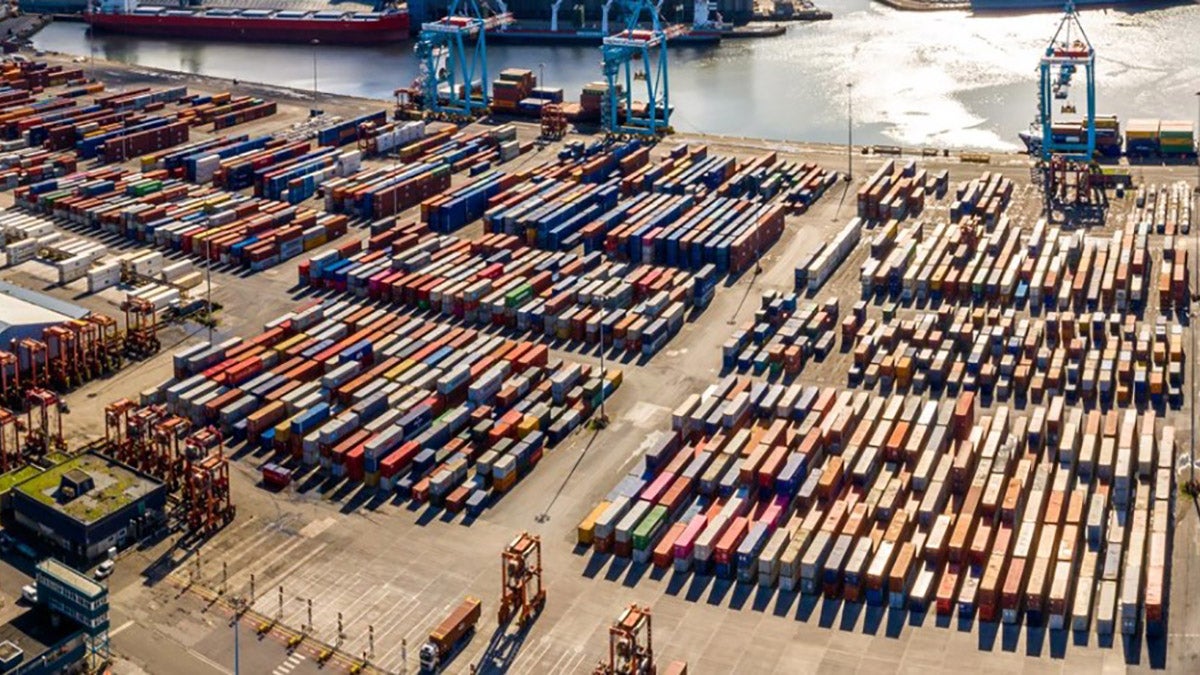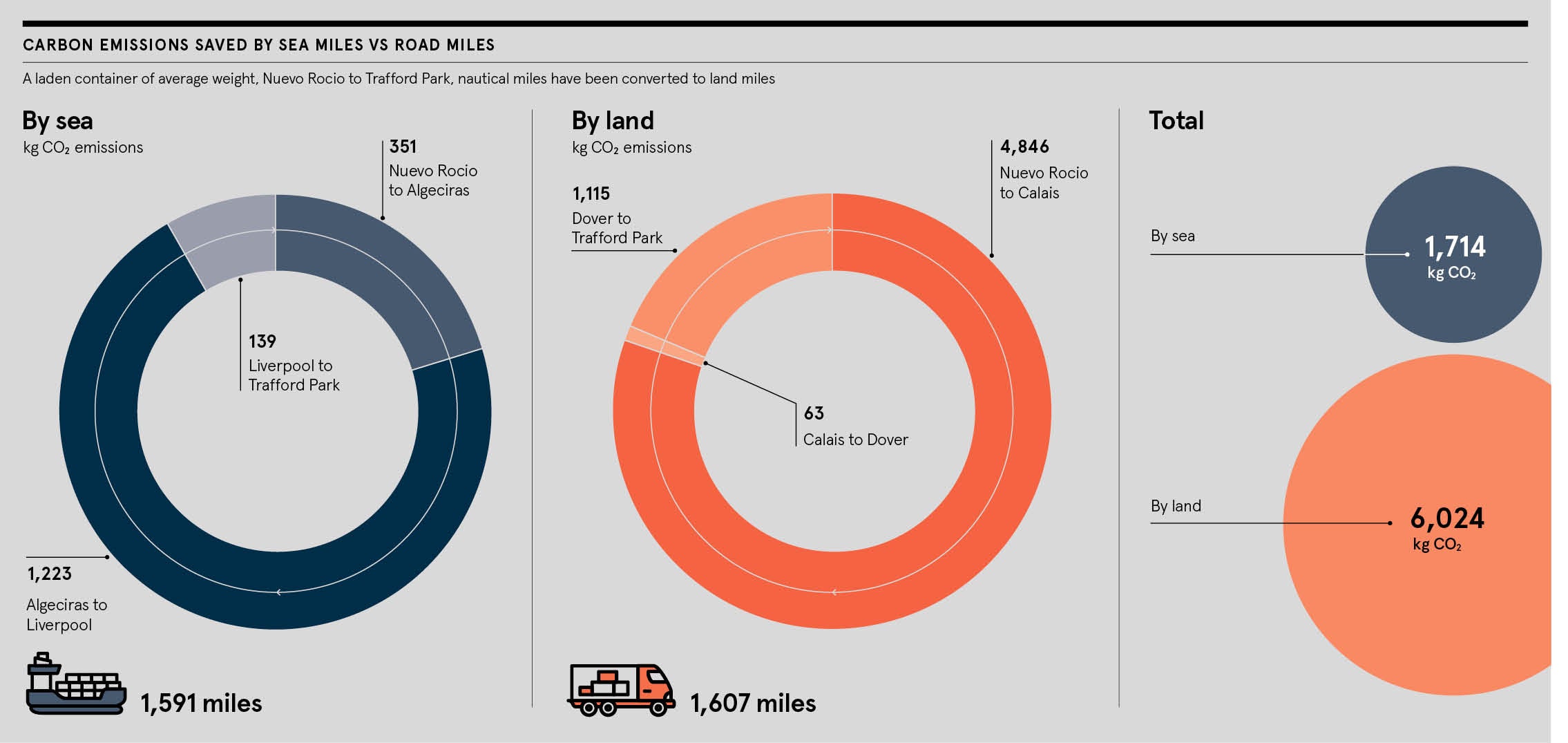
An astonishing 95% of the world’s traded goods are carried by sea and maritime trade is expected to triple over the next 30 years. In the UK, the vast majority of the products we consume arrive at a British mooring in a ship. This means that ports, as businesses, have a crucial role to play in facilitating the race to net zero carbon emissions.
Even though ports are not big emitters, freight accounts for 40% of global transport emissions. This is set to increase by 22% by 2050, meaning something needs to be done. It’s why ports around the UK - and globally - are taking the lead, building sustainability into their operations and leading the logistics industry in a shift towards decarbonisation.
“We are a key facilitator of goods moving into the British Isles and provide key hubs for supply chains. We are trying to do a lot to reduce emissions, but also work alongside shipping lines and supply chain partners so they can become greener. But it is a journey and there is a lot more to be done,” explains Lewis McIntyre, managing director of port services at Peel Ports Group, the UK’s second largest port operator which runs 7 ports and terminals across the British Isles.
Work has already begun. At many ports, dockside electric cranes work on renewable power, while software ensures container movements are optimised to save energy and electric vehicles make up nearly 50% of the fleet. Instead of using diesel when ships idle in docks, Peel Ports is planning how these can plug into the ports’ electric supply - a process called cold ironing. Dock levels are also topped up with rainwater from warehouse rooftops, saving vital energy pumping.
“We have a vision. We already know the destination,” says McIntyre. “In the future, a ship will dock using cleaner fuels, such as ammonia, and offload container cranes electrically, while the plant equipment will use hydrogen. You then distribute cargo along electric rail lines to warehouses that also use green electricity. The final mile distribution centres then use hydrogen-automated trucks and they can deliver at night to reduce congestion.”
Right now, the primary fuel for UK ports is diesel, yet the government is removing the red diesel subsidy in April next year. This will double the cost of fuel for ports and highlights the need for change. Recent energy price volatility is also triggering further impetus to transition to renewables and do so at speed in order to remain competitive.

“Evolving legislation means we have to accelerate change. It’s worth the upfront investment today in order to benefit tomorrow. Energy insecurity plays into this,” says McIntyre. “The shift to net zero for ports is also part of the recovery mechanism after the pandemic. Businesses such as ours are using this as a real driver for change to get a greener economic recovery into the UK.”
Ports are also gateways to the UK’s onward and inshore supply chain. Reconfiguring the movement of goods into and across the country could lead to huge emissions savings. Some 90% of deep sea containers imported into the country arrive at ports in the south, such as Felixstowe and Southampton. Yet an estimated 60% of these goods are destined for north of Birmingham and are moved by road in heavy goods vehicles, despite sea miles generating much lower emission levels.
“We need to get goods closer to their end destination with fewer emissions and make supply chains less carbon intensive. Shipping more goods to northern ports is a no-brainer. This will mean fewer HGV drivers, lessening the labour shortage, as well as lower fuel consumption and road miles. Ultimately this will drive investment in the north, feeding into the levelling up agenda,” says McIntyre.
Last year, the port of Liverpool secured new services with short sea freight operator CLdN, which brings in fresh produce from Spain and Portugal. This changed shipment flows into the UK away from the congested ports of Calais and Dover and into the north, much closer to the warehouses, markets and households where it was needed.
We now have the Dragons Den of sustainability. This is how we will imaginatively drive the net zero carbon emissions agenda forward. It is a gamechanger
“As an island nation we import most of what we consume. The British Retail Consortium wants its whole supply chain to be net zero by 2040. This is a monumental task involving logistics, shipping lines, ports and final mile deliveries. This is driving the agenda forward. It’s a whole movement and requires a more sustainable ecosystem, which is why we need to think holistically. Yet ports are a key component of the supply chain, so we have to lead in this move to net zero,” says McIntyre.
“As an industry we certainly need to work more closely together and learn from pilot projects that happen around UK ports and what could work for all. We also need industry-wide collaboration in order to pilot, trial and then implement the best low-carbon solutions.”
Peel Ports has invested more than £1bn over the past 10 years on infrastructure. The focus of this investment is on driving down emissions as part of a sustainability agenda that is fully integrated into its strategic growth plans.
The company’s supply chain partners have to sign up to sustainability codes that align to their carbon emission values. It is also investing £500,000 in electric charging infrastructure for new vehicles and conducting trials of greener fuels, such as hydrogen and electric alternatives, for plant equipment.
“If you aren’t investing, then you aren’t aware of the new solutions out there. That’s why we’ve created an innovation forum that tries to solve some of the biggest questions around emission reduction. The forum tracks down answers from universities, entrepreneurs and consultants, which can then pitch their ideas into Peel Ports. We invest in the best innovation and deploy it at scale,” explains McIntyre.
“We now have the Dragons Den of sustainability. This is how we will imaginatively drive the net zero carbon emissions agenda forward. It is a gamechanger.”
Find out how Peel Ports is driving change at www.peelports.com
Promoted by Peel Ports

An astonishing 95% of the world’s traded goods are carried by sea and maritime trade is expected to triple over the next 30 years. In the UK, the vast majority of the products we consume arrive at a British mooring in a ship. This means that ports, as businesses, have a crucial role to play in facilitating the race to net zero carbon emissions.
Even though ports are not big emitters, freight accounts for 40% of global transport emissions. This is set to increase by 22% by 2050, meaning something needs to be done. It’s why ports around the UK - and globally - are taking the lead, building sustainability into their operations and leading the logistics industry in a shift towards decarbonisation.
“We are a key facilitator of goods moving into the British Isles and provide key hubs for supply chains. We are trying to do a lot to reduce emissions, but also work alongside shipping lines and supply chain partners so they can become greener. But it is a journey and there is a lot more to be done,” explains Lewis McIntyre, managing director of port services at Peel Ports Group, the UK’s second largest port operator which runs 7 ports and terminals across the British Isles.

